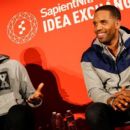
[ad_1]
NEW YORK — During opening statements Tuesday, attorneys for a former Adidas executive did not deny he conspired to or made payments to the families of high-profile basketball recruits.
“NCAA rules were broken,” attorney Casey Donnelly told the jury. “We are not going to waste your time pretending these families did not get funds.”
But James Gatto’s defense team alleges that the former executive was simply asked to match other offers being made from rival programs to prospects, in order to level the playing field for Adidas schools. As a result, Donnelly argued, Gatto was helping the universities determined to be the victims of fraud — not hurting them, as the government argues.

“Student Athlete” tells the stories of five current and former collegiate athletes who believe they’ve been exploited by the NCAA system.

As the first federal trial begins Monday in a corruption scandal that threatens to engulf college basketball, the coaches at four schools mentioned in the indictment are not the only ones nervous. Coaches at a half-dozen other schools could come up.
1 Related
Gatto is one of three defendants accused of conspiring to facilitate money from Adidas to the families of top recruits to ensure they signed with Adidas-sponsored colleges, and then the sneaker company and certain financial advisers and agents once they turned pro.
But Donnelly said in her opening statements that coaches at Adidas-sponsored schools asked Gatto for help in securing the highly ranked players.
Specifically, Donnelly alleged the evidence will show that Gatto agreed to pay Brian Bowen’s father, Brian Bowen Sr., $100,000 for Bowen to attend Louisville, but only after Nike-sponsored Oregon offered the recruit an “astronomical amount of money” to sign with the Ducks.
Donnelly said Gatto and defendants Merl Code and Christian Dawkins also schemed to pay Nassir Little’s family $150,000 to steer him toward the Miami Hurricanes, but only after Arizona, a Nike school, offered the five-star prospect from Florida the same amount to play for the Wildcats. Little committed to North Carolina shortly after the investigation broke last September.
And Donnelly said Gatto assisted Kansas by approving a $20,000 payment to Silvio De Sousa’s guardian, Fenny Falmagne, to reimburse Under Armour, which had paid him to ensure that he signed with Maryland.
“That is a far cry from criminal wire fraud,” Donnelly told the jury.
In her opening statement, Donnelly emphasized that breaking NCAA rules is not necessarily breaking federal law.
“The NCAA rules are the not the laws of the country,” she said. “It’s like a kids’ after-school soccer league, if that soccer league also brought in $1 billion a year. These aren’t the laws. They’re the equivalent of the rules in your apartment building. If you break them, you haven’t broken the law. It is not against the law to violate NCAA rules.”
Donnelly told the jury that Gatto thought of the schemes as a “win-win-win” scenario that benefited all three parties involved: the universities, by getting top-ranked players; Adidas, by getting top players at Adidas-sponsored schools; and the players and families, by getting money to tide them over until they could play professionally.
“The basketball coaches would ask for Jim’s help in recruiting particularly talented basketball players to their programs,” Donnelly said. “I suspect you know what kind of ‘help’ the coaches wanted from Jim. He’s not a guidance counselor. Jim understood that Adidas should help the families out if that’s what the coaches wanted.”
The government began Tuesday’s opening statements by describing how Gatto, Code and Dawkins conspired to funnel money to Bowen’s father — and then conceal the scheme.
According to the government, Gatto and Code masked the payment by submitting fake invoices through a grassroots team under Code’s control. Gatto approved the invoices knowing the payment was for Bowen’s father, and then Code had the money wired to Bowen’s father as a consulting fee. They then instructed Bowen not to say anything to Louisville.
“This is what corruption in college basketball looks like,” one of the assistant U.S. attorneys told the jury.
Source link

